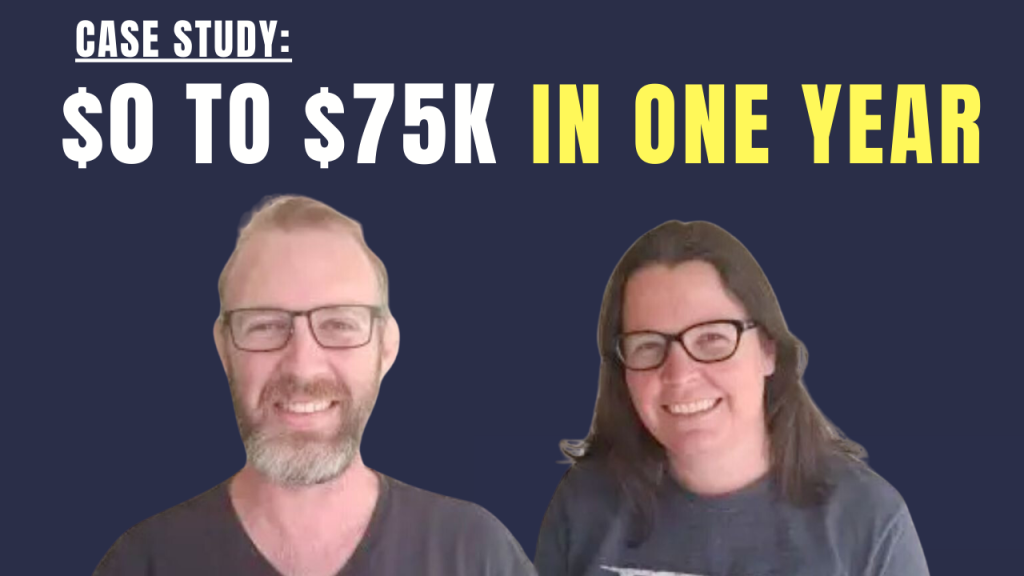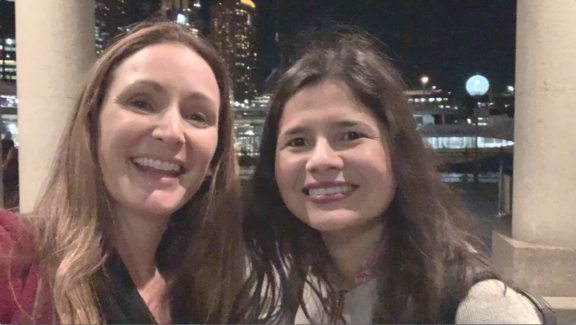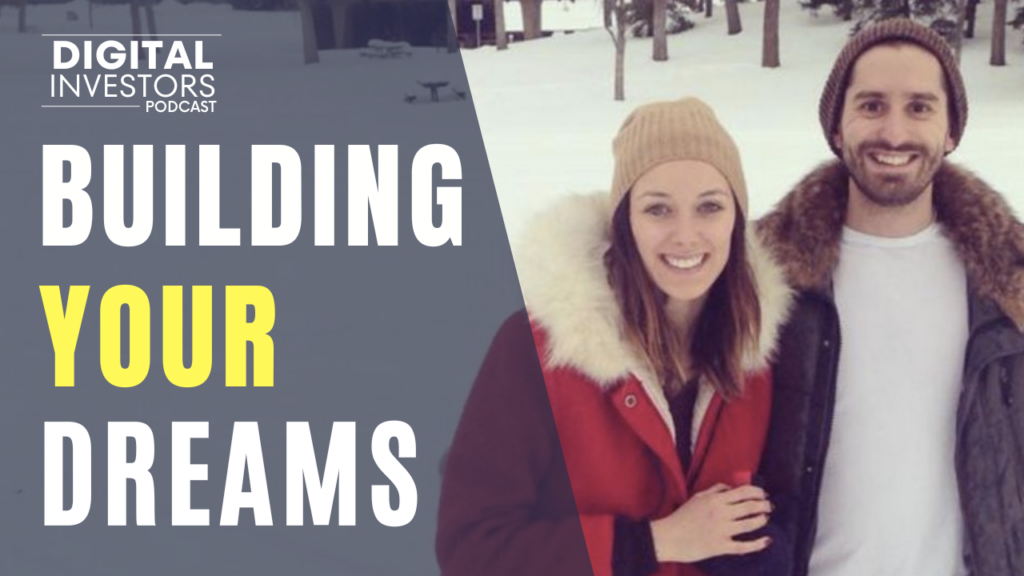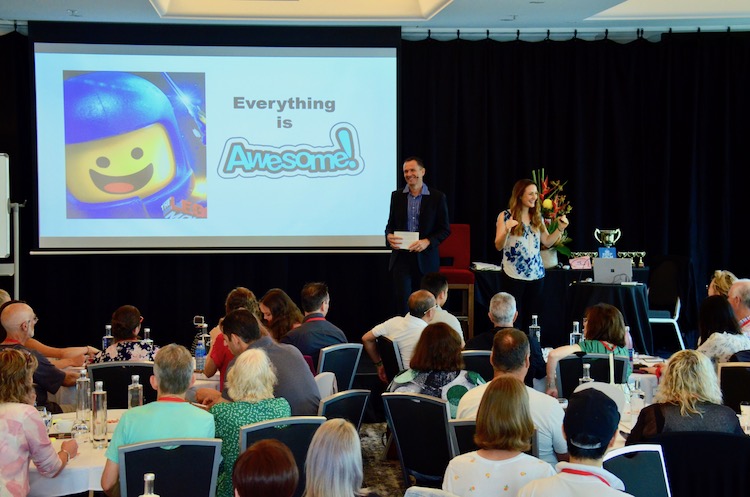See how Kim & Nick turned a learning year into an earning year, making over $75,000 in their first year of the Champions program…
Imagine starting from scratch, with no digital experience, and hitting $75K in your first year.
That’s what Kim & Nick achieved and in this interview, you’ll hear how they did it, including:
- The strategy that led them to their first $12,000 website build
- How they transitioned from non-digital careers to successful website owners
- The power of staying committed through a steep learning curve
- Kim & Nick prove what’s possible when you commit to learning new skills, even when starting from scratch.
What makes their story truly inspiring? They started with zero digital skills, yet turned a “learning year” into a six-figure journey.
Want to know how they did it while juggling full-time jobs and life on the road?
Keep reading or watch the interview below to discover the strategies that helped turn a learning year into an earning year.
Matt: Today, I’ve got two awesome guests with me. These two have managed to achieve $75,000 in their first year with us in the Champions program, our high-level entrepreneurial coaching program. We’ll chat with them about how they did it, but also dive into their colourful backgrounds. So, welcome, guys!
Nick: Thanks, Matt. It’s great to be here.
Matt: I’ve got to say, I’m thrilled to see you’re both wearing my favourite shirts! You always show up at our events, both online and live in-person, in these colourful donut shirts. Your unique, colourful background is such an essential part of your story. So, a big thank you for joining us today.
Now, let’s get into it—$75,000! You both know the first year in Champions is meant to be a learning year, not an earning year, right? What’s the story behind this?
Nick: I remember during the Champions interview, you said, “Slow down, it’s a learning year, not an earning year,” but I thought, we’ll see about that.
I tend to jump headfirst into things, and I’m enjoying the journey so far. It’s still just the beginning, but with Kim’s help, we’ve been able to reach a lot of our goals.
Matt: You certainly are hitting those goals!
Kim & Nick both came from unique, non-digital careers
Matt: I just want to clarify, did either of you have any digital skills before joining us?
Nick came from a traditional career in transportation with zero digital skills
Nick, did you have any digital skills when you started?
Nick: My background is in transport, so I didn’t have much digital experience at all. So, my first experience with websites was through the WebDev program.
Matt: And what was your main career before this, Nick?
Nick: Most of my career was spent as a chef, a long time ago. I then moved into driving coaches across Australia, doing airport transfers and tourist trips.
Eventually, I moved into a management role, but that was more about managing people than the technical side. I used a computer, but it was mostly about managing staff rather than anything related to online skills.
Kim retired after building and selling a successful gymnastics business
Matt: Kim, your story is a bit different. I used to think you didn’t have any digital skills, but I just realised you’ve actually been with us for a while now. Where were you at with your digital skills when you first started?
Kim: Before meeting you and the team, I was coaching cartwheels and handstands, and had built a gymnastics club.
I created a website for the club, and without realising it, the site started to look very business-like. The process of building it gave me a strong foundation, even though I wasn’t aware of where my skills were taking me at the time.
I learned bit by bit along the way, gradually developing the site. Looking back at my old bricks-and-mortar business website is quite fun, especially when I think about the SEO, the social aspect, and how it drove traffic back to the site.
I wish I had understood analytics back then because I could have developed a strong SEO strategy. But at the time, I didn’t know what I didn’t know.
After selling the business and retiring, I hit the road and started travelling the country. I set up a little travel blog as a side project while driving solo in my caravan—I like to call that period ‘BN,’ Before Nick.
Matt: Yes, so before Nick came along—love it! So, how long ago was this?
She started Digital Investors and created a travel blog while travelling through remote Australia
Matt: This is a great story, Kim. You built up your gymnastics business, sold it, and retired. So, during that time, you travelled solo around Australia in your caravan. That was ‘BN’—Before Nick. What year are we talking about? When was this?
Kim: I hit the road in 2017 and spent about five years travelling. I went through the middle of the country, eventually reaching Darwin, where I picked up some temporary work, flying in and out of Indigenous communities to coach gymnastics, which was incredible.
Most of the work was contract-based, so nothing kept me in one place for too long, but it gave me some great travel stories to add to my blog.
When COVID hit, I ended up in a medical centre, of all places, and stayed in Outback Queensland for a couple of years in a town called Camooweal, near Mount Isa. It’s a remote mining community with a lot of that type of workaround.
…Although she was semi-retired, she picked up contract work throughout rural Queensland
After that, I moved on to a few other places, working maternity contracts and other jobs for the council in a town called Roma, about six hours west of Brisbane.
Matt: That’s quite the route, and Roma has some great cattle yards, too. So, for the last five years, you’ve been very involved in rural areas in the oil and gas sectors.
Kim: Definitely! The lifestyle pulls you in—the communities, the people, and the red dust. Nick, being a city boy, wasn’t used to it at all! After we met, he was still cleaning red dust out of my car’s wheels for about 12 months. Even now, when we visit my friends, we return to Brisbane with more red dust, and he happily cleans the car again!
Matt: It sounds like you were living the classic outback lifestyle, Kim, with FIFO (fly-in, fly-out) contract work. You were semi-retired but still taking on work whenever something came up.
Kim: Yes, I started out doing convenient maternity contracts. Once I got involved in the community, people wanted me to stay on because they knew and trusted me. But being a traveller, I’d just hitch up my caravan and move on to the next town.
Eventually, I got the licences and qualifications to work in the mining areas. At one point, I even worked in an acid plant, which was quite an exciting experience. It was a dangerous environment, though, with toxic chemicals.
Matt: Did you say an acid plant?
Kim: Yes, they produced acid and eventually made fertiliser. It was a very hazardous place to work. That’s when I started meeting Nick, and he was like, “You need to get out of there.” He didn’t want me working one week on and one week off in such a dangerous job while he waited for me to come home.
How their journey shifted towards becoming professional website builders
Matt: So, this is a key part of your story. Where and when did you two meet? At this point, Kim, you had been on our program since 2015, so you already had some digital skills and were travel blogging. But how did you meet Nick?
Nick: We’re both originally from Victoria, but I moved up to Brisbane during COVID when I was offered a management role. At the time, I was stationed in Chinchilla for a mining shutdown, and Kim was working in a town about four hours west of Brisbane. Funny enough, we met on Tinder and later realised we were staying in the same hotel.
Matt: That’s a classic story! You two didn’t even know you were staying in the same hotel. For any of our readers, you can look it up—Chinchilla, as Nick said, is in the middle of nowhere. It’s definitely Outback Australia, about four hours west of Brisbane in the red dust.
So, you were in the same hotel, and that’s how you two met.
Kim found a job back in the city…
Matt: Kim, when you met, how did you convince Nick to get into the digital stuff? He had no background in digital work, was in a travel company, and then meets this amazing lady travelling around in a caravan. He must have thought, “This is cool!” How did you get him into the digital side of things?
Kim: Well, that’s another interesting story. He convinced me to leave FIFO work and take what he called a “boring old desk job” in the oil and gas industry. I’m still working that job part-time to this day. Then, he said, “If you’re going to move back to the city, let’s do it.” So, off we went to Brisbane.
We found ourselves a nice little lease, which wasn’t easy with about 80 to 100 other people at every inspection.
…and Nick used his long service leave to start learning his digital skills
Kim: Eventually, we got a place, and three months after moving in, he had taken long service leave, so he was off for three months.
About four weeks into his extended holiday, I’d come home from my day job doing data entry, and he’d be eagerly waiting to tell me all about what he watched on the Food Channel that day.
As an ex-chef, that pretty much became his daily routine—watching the Food Channel and crafting a menu from it. He’d tell me all about it the moment I walked through the door! But I needed some breathing space after work to decompress, so I quite strongly suggested he start using his brain during the day!
So, I logged him into some of the training videos I had in my collection and sat him down. Funny thing was, by the time I got home from work, I couldn’t get him off the videos! He really threw himself into it. For someone who didn’t like school much and preferred to hang out at the beach in high school, he did a fantastic job learning all the new digital skills.
Matt: I saw that in your accountability reports to us. That’s awesome, Nick.
He started to work through the Digital Investors program training on how to buy and renovate websites
Matt: So, you started studying the Digital Investor Program, which is the program where we teach people how to buy and renovate websites. You might have heard about it in our free masterclass. It’s the same program Kim joined all those years ago.
Nick, you were working through this program during the day, and now, fast forward to today, you two have become legends in building websites. You’ve really made something special out of it.
Within one year of Champions they won their first client project!
See how Kim & Nick utilised the hands-on coaching in Champions to help them navigate their first website project…
Matt: This past year has been an incredible journey for you both! You’ve built a successful digital agency in Brisbane and Melbourne. How did this start for you?
Nick: Since joining the Champions program, we already had one project in the pipeline. A friend of a friend connected us with the Roma Show Society committee. But it wasn’t until Kim went part-time that things really took off, and the business has been growing steadily ever since.
The Roma Show website was a huge learning experience—it was a 47-page site that we did as a sponsorship build.
It took a lot of time and countless phone calls with the coaches, so it was quite a steep learning curve.
Once the site went live, we realised we had become a digital agency and could take on more work. Kim went part-time in March, and from there, things just skyrocketed.
Matt: For those who might not know, Roma is a large inland rural town in Outback Australia, known for cattle and oil and gas. The Roma Show is famous in these parts—it’s a big annual event, as you’d expect for rural towns.
Nick and Kim’s first major website project was for the Roma Show, and as Nick mentioned, there were plenty of calls to the coaches for help!
You two really jumped in at the deep end with this, and even though it was a sponsorship deal, it was an important website. You don’t want to make mistakes on something as significant as the Roma Show website, especially with 47 pages! Hats off to both of you for taking it on.
They found this project through their local community
Matt: Now, that project came about through some old-fashioned networking, didn’t it? Kim, how did you land such a big job like that?
Kim: It definitely put us on the map! It all happened quite unexpectedly. We were house-sitting for some friends of mine—I used to park my caravan on their property when I lived in Roma. We went to catch up, and I introduced Nick as the new man in my life.
When they found out we built websites, they jumped on it. At the time, I told them, “Not yet—we’re still working towards it. We have an interview with a guy named Matt, and we’re hoping to get into this program called Champions.” But they said, “Well, you can build the Roma Show website,” and that was it—it was locked in!
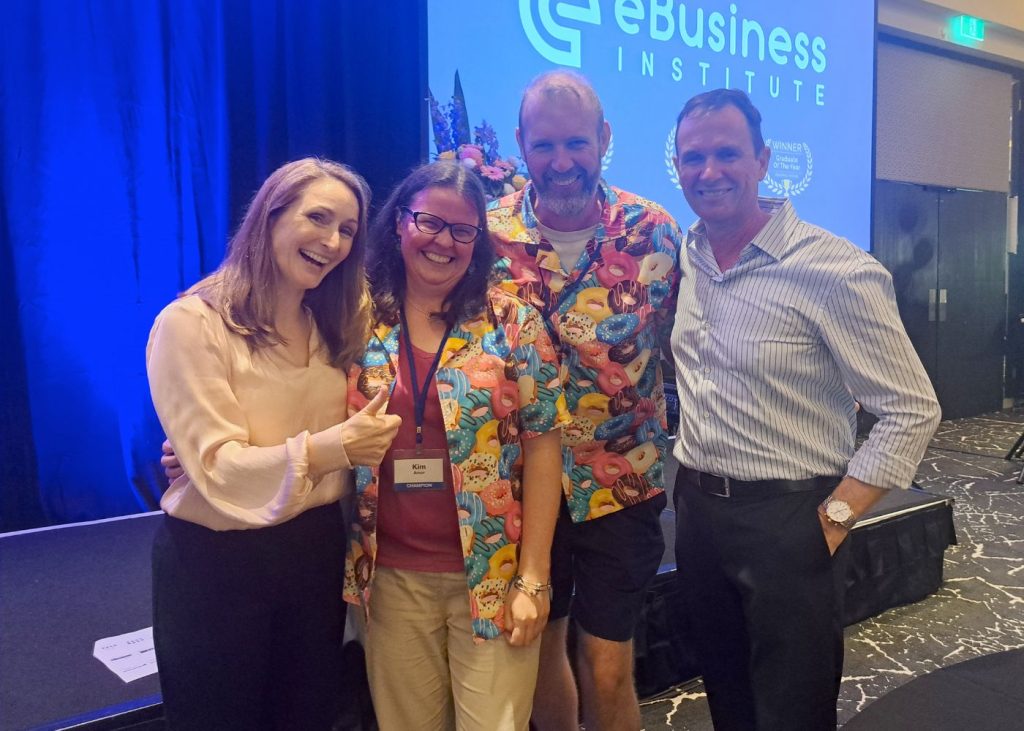
Kim & Nick decided to focus on the Digital Agency strategy
How COVID shifted Nick’s focus away from his traditional career and backed himself into running their new digital agency full-time…
Matt: Wow, when you joined Champions, it sounds like you hit the ground running! So, that’s why you decided to focus on a digital agency strategy.
Kim & Nick have been building websites for local businesses, like the Roma Show, and really diving into the digital world. Was that always the goal?
I remember Nick wasn’t working at the time. With COVID and all the travel restrictions, how did that impact things for you?
Nick: I never went back to work after that. We’ve just been focused on building the agency.
Kim: It was about four weeks into his long service leave when he said, “This digital agency thing sounds really interesting.” And he didn’t want to go back to his old job after that—he wanted to focus on building websites and the agency.
Matt: Wow, so you really backed yourselves.
Kim negotiated part-time hours with her work to be able to focus more on the agency
Matt: And Kim, you stayed in your oil and gas role to support yourselves, right? It’s a well-paid role with flexible hours.
Kim: Well, Administration doesn’t have the highest pay rate.
Matt: But you’re not doing FIFO (fly-in, fly-out) work anymore, so you’ve taken a pay cut compared to what you were making in FIFO, right?
Kim: Yes. I was earning more in the industrial cleaning and acid plants out in the remote areas, but now I’m in the city, where the pay isn’t as high.
Matt: Isn’t it funny? You work in the city but don’t get paid as much as you did out in the remote areas.
Kim: It’s true, and sometimes the city offices can be just as stressful. But it’s been worth it for the lifestyle change.
I managed to negotiate a part-time position with hours that I could do from home, which I arranged in March this year. That gave me more time to focus on networking and building connections while Nick handled the technical side of our website builds. We complement each other really well in that way.
Matt: That’s fantastic! You negotiated more flexible hours, and we’re seeing this a lot nowadays, especially post-COVID, where people can negotiate to work from home with more flexibility. And Nick, as you mentioned, everything took off once Kim went part-time and that could be something to consider as well.
Kim, having the ability to go part-time was a huge help, and Nick, you were full-time on this since you never went back to your old job. Hats off to both of you for backing yourselves—it’s fantastic to see what you’ve achieved!
See how Nick & Kim earned over $75,000 in their first year!
Matt: Your first year of Champions is typically seen as a “learning year,” yet you contracted $75,000 of work! At the 12-month mark, what’s the recurring revenue you’re seeing from maintenance packages and similar services?
Nick: Right now, we’re bringing in about $3,000 to $5,000 monthly from ongoing SEO, hosting, and maintenance packages.
Matt: Well done! That’s incredible because you’re not even expected to be earning much at this point. Pulling in $3,500 in recurring revenue each month is fantastic.
They went from building sites for free, to now charging up to $12,000 for business website builds
Matt: What’s the average price you’re charging for website builds after 12 months? How did that evolve?
I know you started with a sponsorship deal for the Roma Show, but once you began charging for your services, what did that journey look like over the past year?
Nick: We started by doing a couple of free websites to help people out, or in exchange for something they did for us. From there, we gradually increased our pricing. We moved up to $2,500, then $3,000, and eventually $3,500. And now, we’ve just had a proposal come back for $12,000.
Matt: A $12,000 proposal? That’s amazing! Have they accepted it?
Nick: Yes, they’ve accepted the project.
Matt: Wow! You’re not supposed to be pulling in that kind of project in your first year.
They used the guidance of their mentors to gain the confidence to charge more for their work
Matt: So, what did Calem, our coach, say when he heard about this? It took him years to reach that level, and Calem’s a legend—he builds professional websites for big corporates like Channel 10 and more.
What was his reaction when he found out you secured a $12,000 website build in your first year with Champions?
Kim: We haven’t told him yet that we secured the project! We actually had a call with him, and that conversation gave us the confidence to ask for that amount. Initially, we were thinking this potential client might be around the $7,000 mark, but after reviewing some of our previous work, he suggested that this particular build should be closer to $12,000. So, we took a leap of faith and presented that figure to the client.
Nick: It all comes down to mindset. If you believe in what you create, you can make it happen—just like us being on this podcast.
Why having a clear vision has helped Kim & Nick grow their business faster
Matt: Exactly! That’s something I wanted to highlight. You’ve achieved some incredible financial goals in your first year, and hats off to you both for that. But another reason Nick and Kim are on this podcast is that they set a goal to be here!
They emailed me asking, “How do we get Matt’s attention to be on the podcast?” Well, mission accomplished! When you get results like that, you’ll end up on the podcast—it’s seriously impressive. You manifested this opportunity by delivering those results.
And it’s not just the financial side; it’s also really cool to see how you’re working together as a couple. Now, after 12 months, it seems like you have more options than ever. How are you feeling now, looking back over this past year?
Kim is now looking to transition full-time into the agency
Matt: Kim is working in an admin role, which is fine, but you’re meant to be semi-retired, right? How does life feel now after this year of growth and learning?
Kim: Honestly, I’m really eager to go full-time with the agency.
Matt: Alright!
Kim: The admin job just isn’t cutting it for me. It’s mostly data entry, day in and day out, and while that’s okay, I’ve found that the agency work and working with clients is where I thrive.
Our clients are passionate about their businesses, and I love getting them even more excited about their websites. We’re helping them achieve real results, and that’s incredibly rewarding.
In contrast, data entry for oil and gas is just tapping away at a keyboard with no real impact. But with the agency, we’re seeing actual results—our clients’ rankings are improving, domain authority is going up, and I love nerding out over the analytics.
I check the data more than Nick! He’s always telling me, “Stop looking, you’re only supposed to check once a month,” and I’m like, “Okay, fine.” But I love delivering those results back to the clients. Even if they don’t fully understand what I’m saying, they see my excitement and get excited too!
She’s finding opportunities in Outback Australia to educate and help businesses grow online
Matt: So, even though you’re based in the city now, do you still enjoy getting out to rural Australia? Do you find there’s good work for digital marketing out in those outback areas?
Kim: That’s an interesting question. I’m definitely the outback girl, while Nick is still very much a city boy.
Nick: Yes, and where we live is one of the best suburbs in Brisbane.
Matt: It’s a great spot!
Nick: But I do enjoy getting out to see Kim in her element, out in the rural parts of Queensland.
As for whether there’s a market for websites in the outback, there absolutely is. The challenge is that many businesses out there rely heavily on social media, so they don’t fully understand the value of having a proper website. It’s a bit of an educational process to show them that, yes, social media is great, but they also need a solid digital presence through a website and SEO.
Matt: It’s like digital real estate for these businesses. So, when you’re out in those rural towns, do you find that many of them think just having a Facebook page is enough? Is that one of the biggest barriers you have to overcome?
Nick: Yes, definitely. Many of them say, “Oh, we’ve got Facebook, we’ve got Instagram,” and some even have TikTok. They think that’s all they need, but we try to explain that they need a full suite of digital products. Like you said, it’s digital real estate. Having a website gives them ownership and credibility. People visit websites to verify a business, learn their story, and get a sense of who they are.
Matt: Including checking them on Google, right?
Nick: Exactly! And a website is an asset they own.
Is there value in growing a digital agency business in rural Australia?
See how Nick & Kim are thriving in a rural market by establishing valuable face-to-face connections with local businesses…
Matt: Out of curiosity, what’s the reception like when you talk to people in the outback about websites? What’s the economy like out there now? With the oil and gas industry booming and cattle prices being really high, it seems like there’s a lot of money out there.
I’ve spoken to a farmer friend who says things are going really well with cattle right now. So, they’re not strapped for cash, are they? What’s it like talking to them about selling websites?
Kim: It’s definitely about education, as Nick mentioned. I don’t think cash flow is an issue, especially given the strong economy with oil, gas, and established businesses. Many of these businesses are generational, well-established family operations.
We’ve noticed some resistance when the son takes over from the father, but the father is still involved in the business. The conversation often ends with, “I’ll have to check with Dad.” However, it’s great that we can stay connected with them fairly easily because it’s such a small community.
Our involvement with the Roma Show has also boosted our presence, as we’re visible through sponsorships on their website, and we’re regularly invited to attend their show and fundraising events. It’s amazing to be so well accepted. We also have friends, which helps—relationships are key at the end of the day.
Matt: That’s awesome. Coming from a country town myself, I know it’s all about who you know. Being there in person really matters.
The big advantage of building strong relationships with the local community in rural areas
Matt: Do you find that you have a big advantage, Kim because you’re actually driving out to places like Roma and Chinchilla? Meanwhile, the trendy digital agencies in Sydney or Melbourne, with their bright, colourful shirts, probably aren’t doing that. Do you think rural communities are a bit wary of city folks?
Kim: Definitely. Even people living there for generations aren’t always considered “locals.” It’s like you have to be there for six generations to be entirely accepted! It’s a bit of a long-standing tradition.
Matt: As a digital agency, cracking into rural towns can actually be easier if you’re willing to travel out there.
For anyone reading this who’s based in rural areas, whether in America, Australia, or anywhere else, there are huge opportunities for digital agencies in rural towns. I’ve always said that, especially if you start with the bigger rural hubs and work your way out. You’re driving out to places like Roma, visiting other nearby towns, and I’d imagine once people get to know you, that face-to-face connection gives you a big advantage over other agencies that aren’t prepared to travel.
Nick: Absolutely. They really value the local connection. They want to know that the person they’re talking to is the one looking after them—not someone on the other side of the world communicating via email. Whether it’s in Australia, America, or the Philippines, they want to know who they’re dealing with.
Matt: Exactly. They want to look you in the eye, meet you face-to-face, and maybe share a beer or a cupcake with you!
Nick: Definitely.
Kim & Nick get to travel to beautiful rural areas to work with their clients
Kim: Just the other day, I got a call from a lady in Camooweal, where I used to live for about two years during COVID. A friend I worked with there now works for a different organisation, and she put this lady in touch with me. She called and said, “I need a website.” So, she’s in the pipeline, and we’ll probably set her up with a website in the next three or four months.
Matt: That’s perfect, Kim! You get to travel back to beautiful places like Camooweal and Roma, do a road trip, pick up work, and get paid for it! It’s amazing how all those years of travelling around have set you up with connections in each of these towns.
Consider the relationships you’ve built in different communities over time—those connections are now paying off. And isn’t it cool that these rural towns keep bringing you back, allowing you to grow your presence? Like you said, Kim, someone who knows you now works for someone else and has called you up for a website.
And like Nick said, as long as people know you face-to-face, that’s what really matters.
How to dress for success when networking with potential clients
Matt: I’ve got to ask, though—when you visit these towns, do you wear those colourful shirts, or is that just a Brisbane thing?
Nick: That’s just for eBusiness Institute! Matt, we originally bought those for a cruise we went on. Then we are like, “What will we do with these shirts? So, they’ve become our shirts for e-Business Institute events, and we wanted your attention during our Champions interview.
Matt: Well they look great! But not something you’d wear into a remote outback town, right?
Nick: Probably not on the first meeting.
Matt: Yes, not for the first meeting—let them get comfortable first!
I was thinking about the general idea of selling to people. We learned from Zig Ziglar, the American salesman, that you should dress just one step higher than your client.
So, if you’re meeting with rural folks, a neat collared shirt works well, or even RM Williams boots and nice jeans with a collared shirt. That seems to go over well, and I imagine it’s the same in oil and gas.
Here’s a little tip: it’s always best to dress just one level above who you’re selling to. If you’re on the Gold Coast (or Miami for our American readers), those colourful shirts would be perfect. A road trip to the Gold Coast would be awesome.
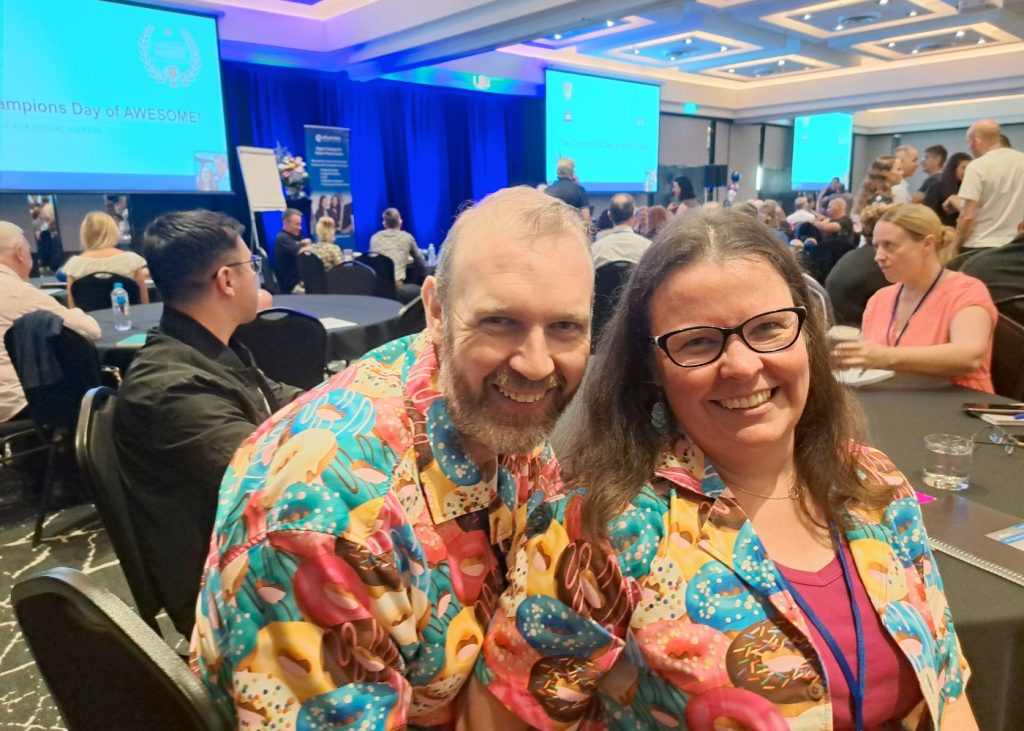
Kim & Nick’s Tips for Success in Building a Digital Agency
Matt: One final question for both of you: what advice do you have for beginners? A lot of people in our community are like you, wanting to transition out of corporate roles or feeling burnt out after COVID.
What have you learned in the past year that’s helped you achieve these amazing results, and what advice would you give them?
1./ Follow the program and trust the process
Nick: Stay the course. A lot of people, and I still hear this now, come into Champions with the mindset of building a portfolio. But many later say, “Matt was right—you should start with a digital agency.” That’s how I’ve grown in confidence, by running the agency.
Honestly, I wouldn’t have been able to do this podcast 12 months ago, but here I am, and I’ve even done another podcast earlier this year, with another one coming up. We’re really putting ourselves out there now, and that confidence has come from sticking with the program and trusting the process. If you do that, it will work.
Matt: Well done, mate! We hear that a lot in these interviews. What Nick said is important—there’s a big mindset component. Confidence makes a huge difference. Thanks for sharing that.
2./ It’s ok to be Perfectly Imperfect: Learn how to work together as a team
Matt: And Kim, what advice would you give to someone starting out on this journey?
Kim: Nick took all my words—“stay the course”! But really, if you’re in a couple, my concern in the beginning was whether we’d be able to work well together. Of course, we’ve had our moments.
Matt: No way, you’re both perfect. I can’t believe it—Nick and Kim, the perfect couple!
Nick: Amazing, but not perfect!
Matt: Exactly—never a disagreement! Just like me—perfectly imperfect.
Kim: Well, I was going to say Nick knows that Kim is always right! We’re learning all kinds of lessons—not just the technical ones from you and Liz, but also how to work together. Someone has to be right, and usually, it’s me, so that helps! 🙂
3./ Don’t do it alone: Use the coaching to help guide you on your journey
Kim: It’s about negotiation, figuring out where things stand, like pricing, and when we get stuck, we know to reach out to one of the coaches. We’ve learned that lesson, too—when we hit a roadblock, we call a coach for a fresh perspective.
You and your team are always there, willing to guide us without just telling us what to do. You help us work it out ourselves with support all along the way. That’s such a fantastic part of the program, and to be honest, we didn’t expect it. I’ve taken a lot of courses before but never experienced this level of ongoing support.
There was never this level of ongoing interest in our progress in other programs, but you and your team have been with us every step of the way.
Matt: That’s awesome, Kim, thank you for the feedback. And a big shoutout to our coaches—they really are amazing, aren’t they? One of the reasons they’re so good is because they’ve done exactly what you’re doing—they all learned how to build seven-figure online businesses.
They’ve walked the path, they know what you’re going through, and they’ve all been Champions themselves at some point. So, as you said, it’s not even so much coaching as it is them sharing their own experiences, and that helps you navigate the challenges you face.
4./ Have fun with the journey!
Matt: Speaking of that, I’ve noticed a lot of couples on this program—not always, of course, but many are couples. So, how has it been working together as a couple on this journey? Has it been fun?
Nick: Yes.
Matt: Absolutely! So, who’s going to answer that one? Nick, you’ve got to say yes, right?
Nick: Of course, I’ve got to say yes! But honestly, it has been a lot of fun. Since Kim went part-time and I’ve been fully focused on the business, we’ve had the flexibility to travel. We’ve been able to go to Melbourne regularly to visit family, work from different locations, and still get things done in our trusted website design business.
We’ve travelled to Roma, down to Melbourne, and even back up through Dubbo—quite frequently. When I was in transport, I couldn’t work remotely because, well, I had to get to the bus physically. But this business has given us the freedom to work and travel, which has been incredible.
Matt: That’s awesome! That’s a key takeaway for everyone reading this: staying the course, working together as a couple, and figuring it out along the way. Huge congratulations to both of you—really well done!
It’s such an exciting time, and I wanted to celebrate this moment by having you on the podcast. Thank you so much for sharing your journey, the numbers, how you met, and your unique niche of working in rural Outback Australia with a digital agency. Mission accomplished—you wrote down that goal, and here you are. Amazing!
Nick & Kim: Thanks, Matt. We really appreciate it!

